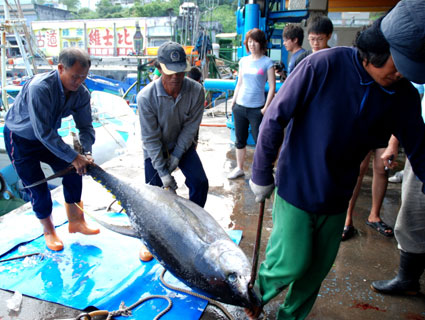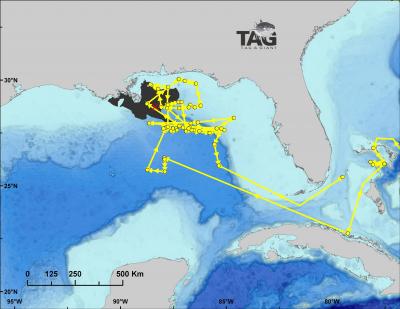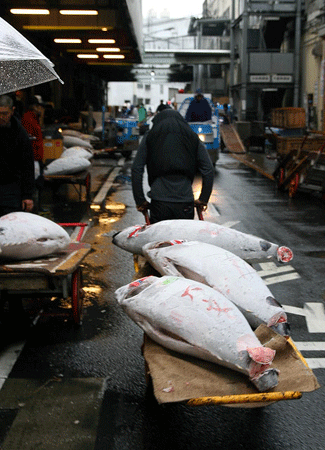
Bluefin tuna at the Tsukiji Market, Japan.<a href="http://www.flickr.com/photos/hashashin/2437853382/sizes/z/in/photostream/">mttsndrs</a>/Flickr
Countries around the world are selling more than twice as much Atlantic and Mediterranean bluefin tuna than international standards allow, according to a new report from the Pew Environment Group. The report, released earlier this week, compares the recorded volume of Atlantic bluefin tuna caught and traded in the Mediterranean Sea and northeastern Atlantic Ocean with catch quotas set by the intergovernmental body responsible for regulating the fish’s trade.
Pew looked at bluefin tuna trade data recorded over the last 13 years by the International Commission for the Conservation of Atlantic Tunas (ICCAT), Eurostat, Japanese customs, the US Department of Agriculture, and the Croatian Chamber of Economy, plotted in the graph below. The data tells us that while the overall recorded catch and international quota declined over time, in recent years the difference between the quota and actual trade volume has increased significantly:
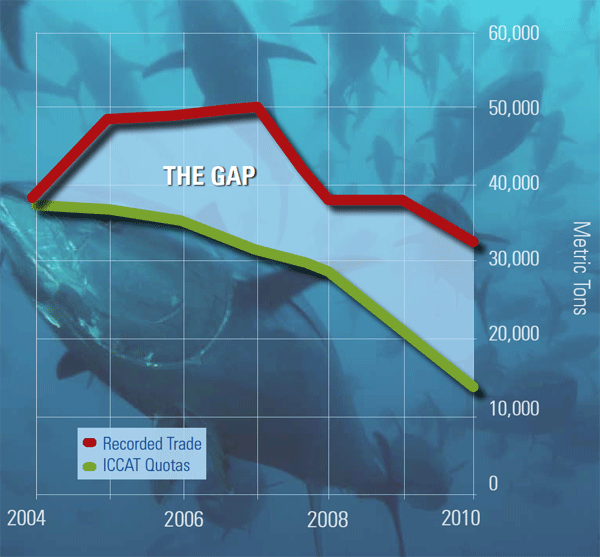 Pew Environment GroupIn 2008 the amount of eastern Atlantic bluefin tuna traded on the global market was 31 percent larger than ICCAT’s quota that year. In 2010, the gap expanded to 141 percent.
Pew Environment GroupIn 2008 the amount of eastern Atlantic bluefin tuna traded on the global market was 31 percent larger than ICCAT’s quota that year. In 2010, the gap expanded to 141 percent.
We’ve long known that national fishing fleets regularly break ICCAT’s catch quotas. But the extent to which the nearly extinct bluefin tuna is being overfished is concerning, particularly since the report doesn’t account for bluefin tuna traded on the black market. On this point: In February 2009 a team of British researchers wrote in the journal Public Library of Science that between 2000 and 2003, an average of 30 percent of all bluefin tuna caught around the world were caught illegally:
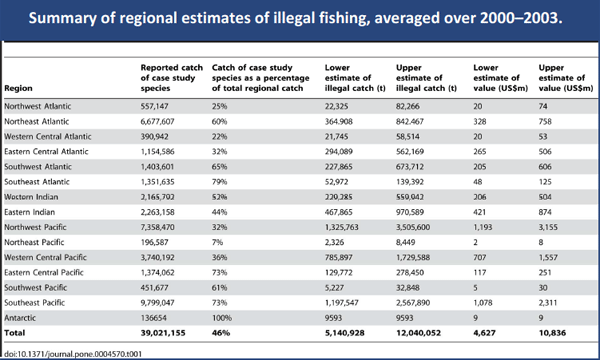 John Pearce et al/www.illegal-fishing.infoReliable and comprehensive data is important, not least because it informs major decisions about species protection. As I reported here in May, the National Oceanic and Atmospheric Administration—the US agency that oversees the Atlantic bluefin tuna—declared that the fish did not warrant protection under the Endangered Species Act. NOAA reached its decision at the time on the assumption that fishing fleets abided by ICCAT quotas. Whether Pew’s findings will prompt NOAA to revisit its decision remains to be seen.
John Pearce et al/www.illegal-fishing.infoReliable and comprehensive data is important, not least because it informs major decisions about species protection. As I reported here in May, the National Oceanic and Atmospheric Administration—the US agency that oversees the Atlantic bluefin tuna—declared that the fish did not warrant protection under the Endangered Species Act. NOAA reached its decision at the time on the assumption that fishing fleets abided by ICCAT quotas. Whether Pew’s findings will prompt NOAA to revisit its decision remains to be seen.
